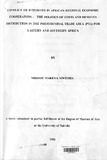| dc.description.abstract | For a long time, the concept of African unity has evoked a widespread enthusiasm for
cooperation from all segments of African society. Indeed, the promotion of economic
cooperation in Africa is now a well accepted part of international development policy. Yet,
regional cooperation in Africa is a subject which has continued to be characterized by a
disturbing gap between aspirations and achievements. Progress has been impeded by various
problems, the most contentious being that national interests have overridden regional
objectives.
This problem has been expressed in the PTA by members states' lack of commitment to the
regional objective of trade liberalization. The lack of commitment to regional cooperation in
African cooperation schemes is inextricably linked to conflict over the distribution of costs and
benefits of econonvc cooperation. Hence, the central focus of this study has been to analyse
the relationship between the distribution of costs and benefits of cooperation and the degree
of member states' commitment, in the PTA.
After setting the PTA in the historical context and the current scenario of economic
cooperation, this study proceeds to identify areas where the commitment to implement treaty
provisions is required from member states, and to show how this commitment has varied
among them. Key treaty provisions have been singled out with the intention of establishing
the extent to which they have been implemented by member states. Implementation has been
seen to be generally characterized by postponements, revisions, and conflicts, which have
V
proved detrimental to the progress of cooperation in the PTA. We have then proceeded to
assess key costs and benefits of the PTA scheme and have drawn out a connection between
their distribution and the lack of commitment exhibited by members. In so doing we have
presented a comprehensive analysis of the politics of costs and benefits distribution in the
PTA. One hypothesis was generated to provide a suitable approach to this issue: that if the
distribution of costs and benefits in the PTA is found to be equitable, then member states will
exhibit commitment to the regional goal of cooperation. The converse of this hypothesis is
also true.
The realist concept of national interest constitutes the conceptual framework for this study.
Central to this concept is that interest is the essence of politics and that states will ignore
national interest only at the risk of self-destruction. Regional cooperation is expected to result
in gains, and these gains are expected to be distributed equitably among member states. The
national interest of PTA members is the equitable distribution of the inevitable costs and
expected gains. We have therefore examined the conflict over the distribution of costs and
benefits in order to reveal the clash of interests that exists between regional and national
interests, jrhis clash of interests has culminated in a lack of commitment to the regional goal.
Finally, we have observed that Kenya's and Zimbabwe's predominance in the scheme has been
resented by other members, a resentment that has in turn negatively affected the
implementation of trade liberalization protocols. | |

